2016 Activity Report
March Activity Report
March 2017
Global Japan Office Coordinator
SOGAME Yuko


Turkmen students are always called to attend various nation-wide events. Also, their definition of ‘volunteer’ is totally different from ours. I used to say ‘You know, if you call something voluntary, it should be based on one’s own will…’ in the beginning of this academic year but I got used to their definition now. Students and faculty members of IUHD (International University for the Humanities and Development) call those events ‘social events’. It is çäre in Turkmen and translated as ‘activity’ in the dictionary: “Turkmen-English/English-Turkmen Dictionary” written, edited and published by Peace Corps Turkmenistan. I am not sure whether it’s appropriate to call this specific English here ‘Turkmen English’. However, I do think this is what it is as there is a great diversity among different Englishes such as ‘British English’, ‘American English’, ‘Aussie English’, ‘Singlish’, ‘Taglish’ and so on. Of course, I just think so in my mind because I don’t want to sound offensive. Especially, IUHD students are usually proud of their English ability so I don’t want to underestimate them.
Students who are not studying Japanese call me ‘Yuko teacher’. There is a word, ‘mugallym’, which is used in the same way as Japanese ‘sensei’ in Turkmen. This can be a title to call an educator as well as a name of occupation. The cafeteria is called ‘canteen’, gym is ‘sport complex’ (it is just one ordinary size building) and dormitories are hostels. You definitely drag people in a huge confusion when you call the head of this university ‘the president’. He is the RECTOR! Also, we have both faculties and departments. I often get confused because I belong to International Law Department in the Faculty of International Law and International Relations at the Department of Social Science according to our university website. I understood the last department as ‘major’ but I am not sure… As mentioned above, we sometimes have small misunderstandings or confusions even though we are communicating in the same language called English.
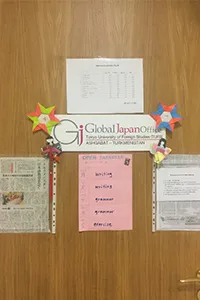
It has been almost two months since the second semester started. I think I am doing better dealing with students here than last semester since I have learnt a lot in the past five months. This will be the eighth month of my stay in Turkmenistan in April.
I struggled very much with students who didn’t understand English and Japanese last semester. Even though the Japanese language course is set as ‘general elective course’, students are basically told to take this course by the university authority, perhaps due to a lack of faculty members and to keep the balance of the number of students and instructors. I decided to be qualified as a language instructor at tertiary level because I didn’t want to deal with students who were forced to learn a foreign language after working at a secondary school in another country and experiencing how difficult it was to motivate reluctant learners. However, I have got another chance to challenge myself here again.
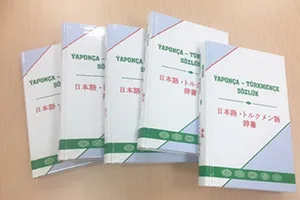
This semester, I divide my students into two groups; (1) classroom group and (2) dictionary group. I asked students which group they wanted to join. Classroom group studies with me as what we did last semester but they learn more effectively and faster now because they chose to stay in the class. The dictionary group just keeps copying a 270-page Turkmen-Japanese dictionary and no homework nor examination. Most of the students decided to be in the second group; dictionary dictation. This Turkmen-Japanese dictionary was published here in 2015 by Japanese language instructors at National Turkmen Institute of World Languages named after Azady. In the end of last semester, I asked all the groups to show me that every single student in a group had his/her own dictionary if they wanted to save some of their classmates who were going to fail in my course. As a result, all the students studying Japanese at IUHD have this dictionary.
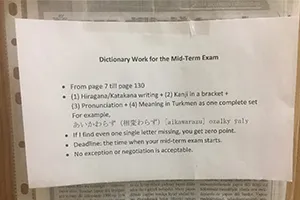
At this university, there is a grading system called ‘SIS’. It stands for ‘Student Information System’. Students’ grade consists of three elements in any course; (1) students’ individual work (SIW), (2) mid-term exam score, (3) final exam score. SIW becomes 25% of their final grade. Mid-term exam score occupies 30% and final exam score makes 45% of their final grade. To the dictionary group, I give them full SIW score if they show up (50%) and write at least one letter during lesson being quiet (50%). SIW of students in the classroom group depends on their everyday quiz scores and homework. It is same as what we did last semester. If students in the dictionary group can finish writing till page 130, a half of the dictionary by their mid-term examination, they’ll pass mid-term exam with scoring 51 points. Then, they have to finish copying all the pages without any missing letters or words by the time we have final exam in order to get 51 points for their final exam. Simply calculating, the maximum score this group can receive is 25+51*30%+51*45%=25+15.3+22.95=63.25. I explained everything clearly and gave them one week to decide in the beginning of this semester. Those who thought it would be higher than their final score of last semester definitely chose to be in the dictionary group.
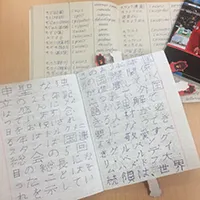
However, there were students who couldn’t decide which was more beneficial for them. I let them join the classroom group first and change their group to the dictionary dictation whenever they started thinking it was easier to get a certain grade, which is definitely promised. Three students have left classroom so far. I don’t allow students to come back to the classroom group from the dictionary group after they changed their mind for better grade because they had missed so many lessons already. Still, I sometimes have to welcome some students who came to my office for further negotiation… I don’t accept any exceptions or negotiation anymore since it is endless here but I really enjoy talking with them and exchanging our opinions. Sometimes, their idea makes a good sense or tells me unwritten rules among local students and instructors. In that case, I don’t mind adjusting their idea.
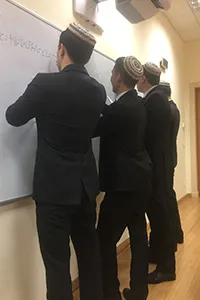
Thanks to this division system, I can finally teach Japanese as I wanted in most of the parts. I still think that it is needed to have at least one more teacher so that I can play a role of ‘native Japanese speaker’. Otherwise, students are not challenging themselves trying to actually use Japanese. Atmosphere and quality of the classroom is much better now compared with last semester but I am not satisfied yet. My way of teaching here spends much time for grammatical explanations. I want to make my class more communicative. I mean, students and I often interact in my class. They often help each other. For example, someone who understood my grammatical explanation in English first shares his/her understanding with their classmates in their language and so on. What I mean is that my next goal is to create an atmosphere which makes them use Japanese.
February Activity Report
February 2017
Global Japan Office Coordinator
SOGAME Yuko
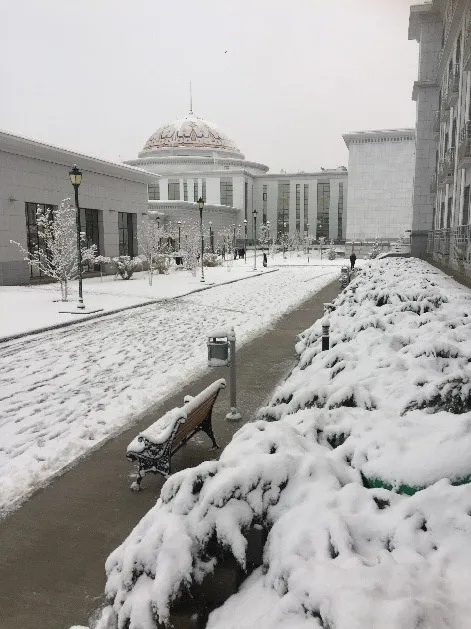
I heard that we don’t usually have much snow in Ashgabat but we’ve already had many snow days this winter. The city of Ashgabat becomes amazingly beautiful when it’s covered with pure white snow. It became warmer at the end of February.
The second semester started on February 2nd. I taught three groups last semester; group A and B of “International Relations and Diplomacy” and a group of “International Relations and World Politics”. This semester, I’ve acquired one more group, composed of students who major in “International Private Law”. The open Japanese courses, which I voluntarily started as a part of GJO activities last semester, still continues. The morning course hasn’t started yet, because it follows the trimester schedule of the Language Learning Department. It will start when the freshmen studying English at LLD come back from their holidays. In the beginning of last semester, many students attended the open Japanese courses. However, the number of participants decreased due to various reasons. Although I feel sorry for those who constantly attended the lessons until the end, I decided to start over from the beginning this semester as the majority of students were new learners. Also, I decided to let two students teach the afternoon lessons. They had started learning Japanese before I came. I provided an extra course for just the two of them. They can do “self-study” and their ability of English is high enough to understand grammatical explanations. They’ve learned very quickly compared with others. Here is my schedule this semester.

As the dean of my department suggested to me, I stared putting a poster called “weekly Japanese” on our students’ information board last semester. The purpose is to introduce one phrase in Japanese a week. I passed this work to students of the morning course later on. Especially, female students made it beautiful with drawing or decorations. One student made a poster saying “Good luck” in Japanese during Bachelors’ final exam week. They all are creative.
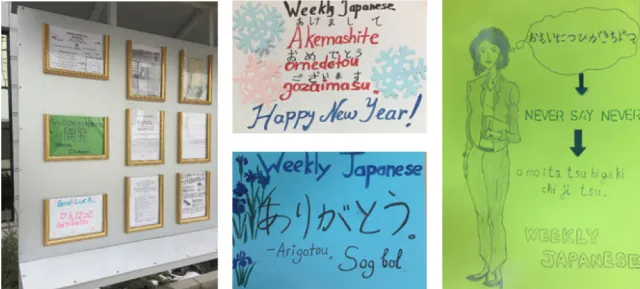
Our university held an international cultural festival on February 15th and 16th. They had a food festival on the first day and stage shows on the second day. I was asked to give advice to the group in charge of Japan and helped them. However, despite my advice, they were fine with take away sushi and their own way of wearing Japanese traditional dresses, so I tried not to care about their level of cultural respect. I thought it was most important to let them have fun.
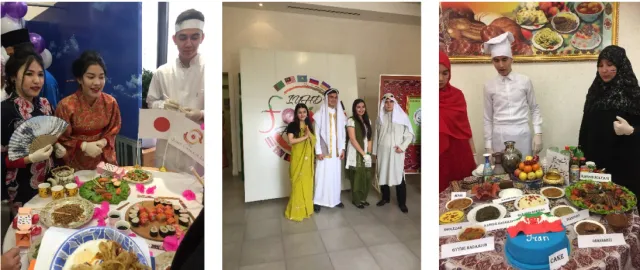
Although I didn’t know much in the beginning of the last semester, I would like to contribute to this university and my students as much as possible based on what I learned last semester.
January Activity Report
January 2017
Global Japan Office Coordinator
SOGAME Yuko

The role of IUHD in Turkmen academic sphere
This university is the first university in Turkmenistan, which provides all lessons in English. It was established in 2014. Previously, it had been common to follow the Russian education system in this country. Under this system, Bachelor’s and Master’s degrees are awarded after 5 years of university education. However, there is a demand for adjusting to a European style education system, because those degrees are not recognized as Master level overseas, especially Western countries. The first of five years in undergraduate study here at International University for the Humanities and Development is spent only for English learning. Students improve their English skills up to the level in which they can keep up with their studies perfectly in English. After this first year, students spend the next four years studying their individual majors in order to complete their bachelor’s degree.
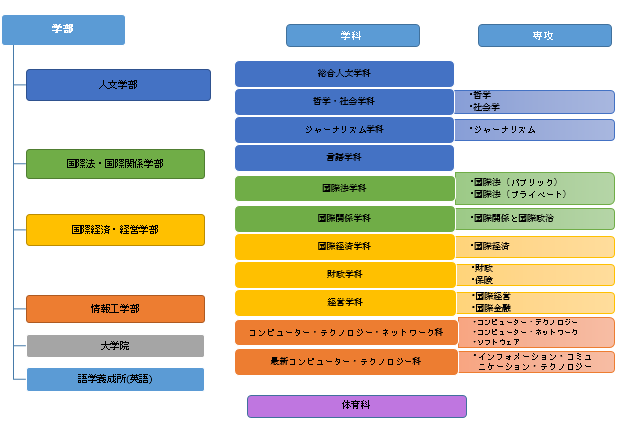
Faculties, departments and majors
There are five academic categories at IUHD. One, the Language Learning Department (LLD), is specialized in English learning for first year students just discussed. The remaining four faculties are for Bachelor degrees; the Faculty of General Humanities; the Faculty of International Law and Relations, the Faculty of International Economics and Management and the Faculty of Information Technology. I belong to the Faculty of International Law and Relations. Humanities and International Law and Relations are in the same academic group while International Economics and Management and Information Technology are categorized together. Students of IUHD must attend a morning assembly every day. They are divided into three groups there; LLD, Department of Social Science and Department of Economics and Management. Although IT is a totally different from economics and management, they are in the same “scientific” department. There are various academic disciplines hosted under those departments except for LLD.
The Faculty of General Humanities manages majors for General Humanities, Philosophy, Journalism and English for Specific Purpose. Faculty of International Law has International Law and International Relations. Faculty of International Economics and Management has International Economics, Finance and Management. Faculty of Information Technology has Computer Technology Network and Modern Computer Technology. These academic sections are also called departments. In other words, there are two concepts of “department” at this university, which can be confusing at times.
Students studying Japanese at this university are those who major in International Relations. Their majors are colored in green in the chart. I hold courses for one group of International Relation and World Politics students and two groups of International Relation and Diplomacy students this semester, but I am going to teach one more group of Private Law students next semester. Our department, the Department of International Relations accepted students from International Turkmen Turkish University, which was closed last academic year. This university had many departments, and its students had to be transferred to different institutes depending on their majors. IUHD received students majoring in International Relations.
Japanese language is supposed to be an elective course. However, all students have to attend two classes a day, which they are forced to take by the university from Monday to Saturday. In other words, Japanese is not an elective but obligatory for them. More than half of the transfer students didn’t have motivation to study subjects in English or even think of studying Japanese, but were forced to do so now. I feel a little sorry for them. IUHD was just established three years ago, and it only has students up to the sophomore level. However, International Relations at International Turkmen Turkish University had students from first to fifth year. Because these students and the new visiting instructor (me) came to IUHD at the same time in the beginning of this academic year, it was a time of chaos. In retrospect, I was not the only one person who was confused in the beginning.
December Activity Report
December 2016
Global Japan Office Coordinator
SOGAME Yuko

Role as a Japanese language instructor
It has been almost four months since I came here. I have learned a lot. Now, I know my position, status or role at this university, at least more than I did in the first couple of months. Basically, no one cares exactly what or how I teach when I am in the classroom – the most important aspect to the people in charge is simply that I, a foreign instructor, am here. Since Japan and Turkmenistan agreed on their partnership in 2015, Japanese language education has been the primary issue of this country. Despite this special political circumstance, I am still the only native Japanese instructor hired by any Turkmen institute. Therefore, I am often asked to participate in events, for example, TV shoots. As an “international university”, IUHD now has four visiting instructors from overseas. We recently welcomed to this university one instructor from Cambridge University who has a similar contract as mine.
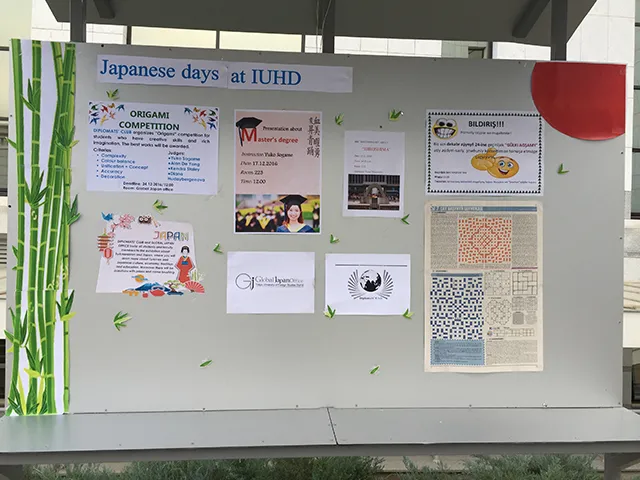
Japanese Days
An event called Japanese Days was held by the Diplomat’s Club this month. It was a school event held on December 16th and 17th. Originally, I proposed an idea to invite a Japanese ambassador for an educational lecture for students here interested in learning Japanese, but it was cancelled by the university administration without any understandable reason. Instead, I was asked to host and support Japanese Days, an event which was suddenly announced just one week before without any prior notice. It was a busy week!
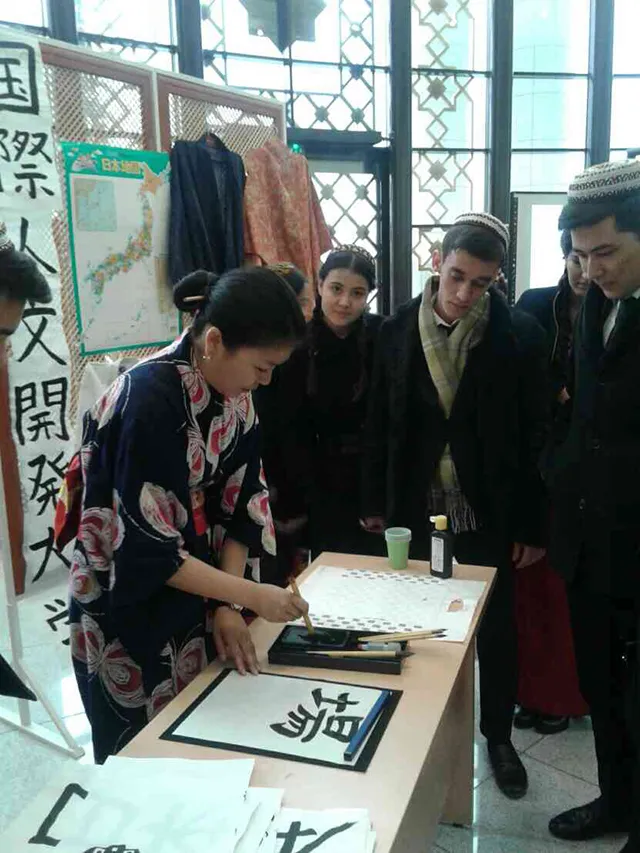
DAY 1
On the first day of Japanese Days, which was held in the foyer of the lecture building, I greeted students there and introduced essential elements of Japanese culture. Educational displays were prepared the day before with the help of students who came to the university in the morning. I wore a Japanese traditional dress, and I demonstrated calligraphy during lunch. Students asked me to have a sushi cooking show, but I refused the idea because of a hygienic issue. They were disappointed about this, however, the calligraphy was very well appreciated by more people than I expected. There was a long line of students and teachers who wanted me to write their names in Japanese with ink and brush. After school, students who were interested in World War Ⅱ watched a documentary film about the atomic bomb in Hiroshima. There were also more participants than I thought. It was a pleasant surprise.
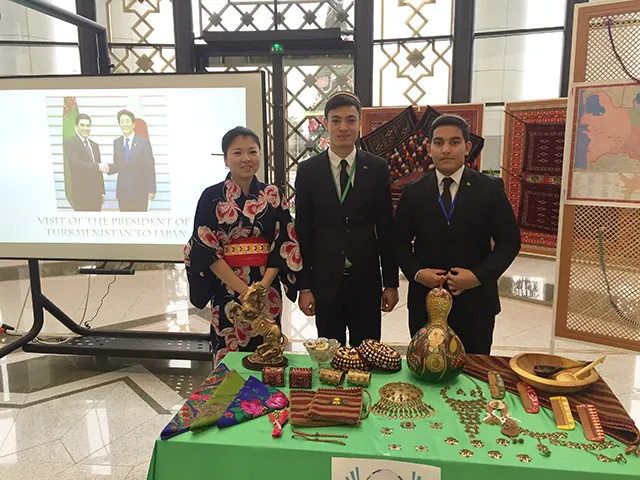
DAY 2
Diana, the visiting instructor from Cambridge, and I had an interesting experiment on the second day. She asked me to let her wear my Japanese traditional dress. I agreed, and helped her put it on. I was in a Turkmen dress instead to welcome students in the morning coming to university after their morning assembly. Everyone not only students but also teachers looked very confused. Diana seemed to enjoy observing them. As a substitute for the Japanese ambassador, I gave a one-hour presentation from 12:00. During the first part, I introduced basic information on Japan. The second part was about the bilateral relationship between Japan and Turkmenistan. At the end, I explained how students could apply for opportunities to study abroad in Japan as Turkmenistan students, and directed their attention to specific Japanese government organizations which support international students such as MEXT or JASSO. During the presentation, I only used Japanese and one student interpreted my speech. Of course, she had a script. There is no one fluent enough in Japanese who can serve as an interpreter, at least not yet. Only four months since they started learning Japanese have passed – I’m confident they’ll be able to do it in the future! After the presentation, I quickly finished packing up all the materials displayed and left the university for “Japanese Conversation Club” at the institute of world languages named after Azadi.
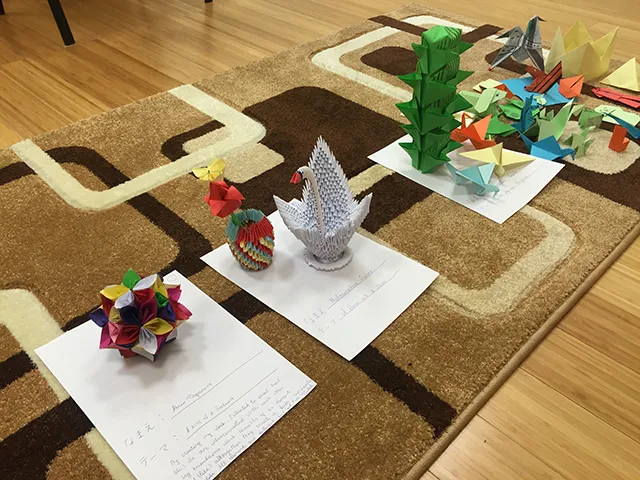
Origami Contest
We had an origami contest during Japanese Days. It was students’ idea. It turned out to be a small contest among two participants and three arts in total. However, all the art work was brilliant. We are going to give awards to the participants at the next monthly morning assembly.
December is the second to last month of the academic year here as well as the last month of the calendar year. So full of social events! I appreciate the efforts of the students and instructors who were involved in this event relating to Japan during such busy times.
October Activity Report
October 2016
Global Japan Office Coordinator
SOGAME Yuko
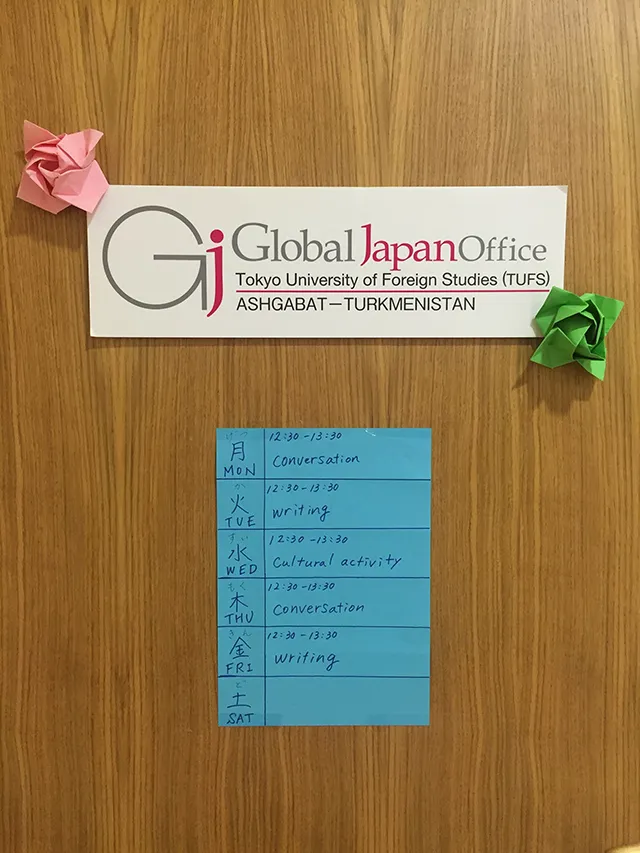
Japanese language lessons
We finish school at 11:40 after 2 sessions in Bachelor’s course. Only students who belong to LLD (Language Learning Department) have lessons until about 2:30.
I provide official classes to 3 groups; (1) one group of students of IUHD (International University for the Humanities and Development) majoring in International Relations and Policy and (2) 2 groups of transfer students from TTU (Turkmen Turkish University) majoring in International Relations and Diplomacy. Each group has about 20 learners.
In addition, I give 2 free lessons in the afternoon as a part of GJO work. (1) Beginner class from 12:30 to 1:30 for about 30 students; 2 conversation lessons, 2 reading and writing lessons and 1 cultural activity day in one week. (2) Advanced class from 1:30 to 2:30 for 2 IUHD students and a visitor student; 5 lessons a week from Monday to Friday. These students started learning Japanese before I came here and have an ability of self-study. The lessons are divided into 2 parts; grammar and kanji. (3) Beginner class from 6:30 to 7:30 a.m. for LLD students who cannot attend the afternoon classes mentioned above because of their regular English classes. Also, as the first year students of this university, they often have to attend “social events”. Moreover, I think they should concentrate on their English learning in their first year. Therefore, I wasn’t planning to provide another additional course for them but I changed my mind because there are still many LLD students who are eager to learn Japanese.
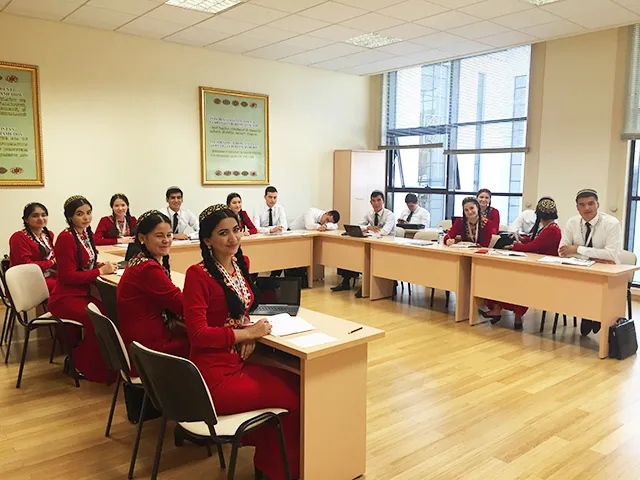
IUHD group
This course is provided for IUHD students who spent their first year at LLD and have a high ability of English. There is no problem in this class from basic instructions to complicated grammar explanations.
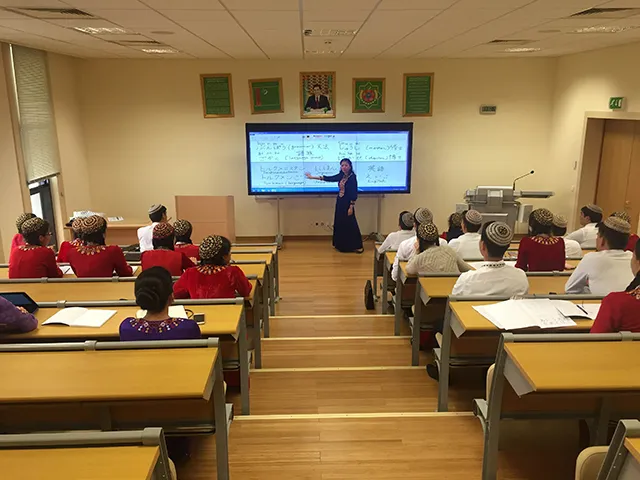
Turkmen Turkish groups
TTU, which was the only one foreign university in Turkmenistan recently closed and all the students of the university had to transfer to other universities and institutes according to their majors. IUHD accepted students of International Relations. I provide Japanese lessons to 45 TTU students in total. They are divided into 2 groups; one group on Tuesdays, one group on Thursdays, and one combined class on Fridays. In the classes on Fridays, student have presentations and debates but not Japanese learning because the number of participants is too big for a language lesson and they have different progresses due to holidays. Topics of their presentations and debates are mainly about the relationship between Turkmenistan and Japan. The first presentation should be an introduction of Turkmenistan towards other nations and with the second presentation, students should give a theme to discuss our relationship between Japan and Turkmenistan.
1. Afternoon class
This is beginners’ course for bachelor’s students without any charge or regulation. About 30 students attend this class so far and several teachers also join it. We have a conversational class on Monday and Thursday. We started learning basic phrases only using Roman alphabets. Now, I have introduced the concept of demonstratives. We have a reading and writing class on Tuesday and Friday. Students practice how to find certain sounds in kana charts so that they can study how to write in Japanese by themselves and learn how to write voiced consonants, contracted sounds, glottal stop and the syllabic nasal. We have cultural activities on Wednesday.
2. Afternoon class
This is an advanced course for two students in this course; one student from the official IUHD group who is eager to study more and one student who cannot attend my official class but has learnt Japanese by himself before I come. I refused their request for another lesson in the beginning because I thought one extra lesson was too much for me at that time. I told them I was not going to give any additional free lesson. However, one of the student didn’t give up and after our negotiation, I decided to have this course for them with one condition, which was offered by the student. They are going to learn Japanese, especially grammar, as fast and deep as possible and start helping my lessons in the next semester or the next academic year. All the classes at IUHD are supposed to be conducted only in English but I have seen teachers using Turkmen when they want to make students understand clearly. Therefore, I thought the offer of the student was interesting. They may be able to play a role as local teachers, which I don’t have here right now. If this idea of offshoring becomes successful, it can be a good model for other educational institutions. I have observed a lack of Japanese teachers among both schools and universities here.
3. Afternoon class
Students of LLD have their official lessons until 14:35 every day or 15:15 on Wednesdays. Also, it is difficult to follow our schedule because they are often asked to attend social events more frequent than Bachelor’s students. Therefore, I let them come to GJO and provide an environment where they can study themselves or in a group and ask me questions about Japanese learning. However, there are still students who visit Global Japan Office to ask me to teach them Japanese. Their passion changed my mind and I decided to provide one more extra Japanese course for them. It starts at 6:30 am on the first of November. It is very early for students according to them but I hope their enthusiasm conquer sleepiness.
These are all of my Japanese lessons right now. The number of students who are interested in Japanese is more than I expected and I am surprised in a good way. I thought I would lose some of them as time passes but I still have many participants. A LINE group for the afternoon lessons has been accepting more and more members. I am very busy but I appreciate the students’ interest in Japanese.
September Activity Report
September 2016
Global Japan Office Coordinator
SOGAME Yuko

International University for the Humanities and Development
This university is the first university in Turkmenistan, which provides all lessons in English. Previously, it had been common to follow the Russian education system in this country. Under this system, Bachelor’s and Master’s degrees are awarded after 5 years of university education . However, there is a demand for adjusting to a European style education system, because those degrees are not recognized as Master level overseas, especially Western countries. The first of 5 years in undergraduate study here at International University for the Humanities and Development is spent only for English learning. Students improve their English skills up to the level in which they can keep up with their studies perfectly in English. After this first year, students spend the next 4 years studying their individual majors in order to complete their bachelor’s degree.
It seems that this university works hard to train future elites some of whom may be destined for diplomatic careers. Most of the students here are interested in foreign countries. Under the administration of the former president but after independence from the Soviet Union, higher education was not regarded as a great importance. Primary education lasting nine years was thought to be enough, and there was no opportunity for higher education unless students traveledoutside of the country. However, after the change of regime, Turkmenistan has been developing rapidly, and the current government is trying to provide a high quality of education so that the Turkmen nation can obtain international recognition abroad, especially in Western countries. For this reason, there is a generation gap among teachers – those who studied during the Russian occupation and young teachers who are in their 20’s.
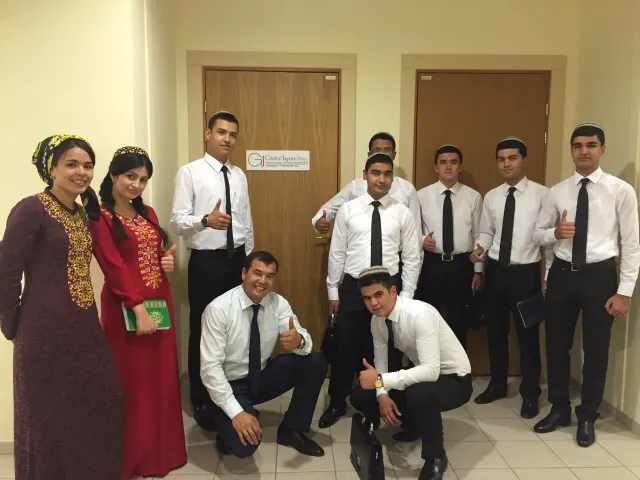
School Life
Female students wear red traditional Turkmen dresses while male students wear a white shirt, suit pants and a black tie. Both males and female students have to wear a traditional cap on their heads when on the University campus. Female teachers tend to wear darker colored dresses so that others can distinguish them from students. Also, teachers who are married have a customary way of wearing their headscarves. Therefore, it is very obvious who are students or teachers and who are married or not married.
University starts at 8:30 a.m. We have a morning assembly at 8:00 a.m. before classes. Students receive various information and have to pass a dress inspection every morning there. One session lasts 100 minutes; 45 mins lesson + 10 mins break + 45 mins lesson in the beginning of this semester, whiles later on the schedule may change to a non-stop 90 mins lesson. It seems like many things have not been decided yet. There are usually 2 classroom sessions for Bachelor’s students, which means most of their classes finish by noon. However, the first year students at the Language Learning Department have 3 sessions a day. Teachers are expected to stay at school until 3:00 p.m. but it is difficult to leave around that time if we are properly committed to our work. Many teachers stay and work until the evening, maybe because it is still the beginning of the academic year.
There are three dormitories in the campus; one for males and two for females. Teachers from distant provinces can stay at the dormitory as well. Students share a room with another student, but each teacher is given one room for two. Students have to be at their dormitories by 8:00 p.m. for the evening call. They are not allowed to go out after that. Each teacher has to take “night duty” once or twice a month. This duty entails that they stay in the guardroom at the entrance until 11:00 p.m. to make sure that the students are okay. This duty has to be performed not only by teachers staying at the dormitory, but also teachers living in the city.
You can see (and hear) both Turkmen speakers and Russian speakers at this campus. Turkmen people switch their language depending on whom they are talking to. I am the only foreign teacher here so far. Therefore, they speak English to me. Turkmen language is commonly used among teachers and students outside ofclass. The morning assembly and the evening call are in Turkmen as well. This is to make sure students can understand the information clearly.
I would to mention one more thing. There are a group of students who were transferred from the Turkmen Turkish University because of its recent closure. They are good at speaking Turkmen and Russian, but they are not so familiar with English. However, they are not going to be trained at the Language Learning Department. TheJapanese language course deals with both groups; regular students of IUHD and transferred students. It is assumed that they are divided into groups according to their English ability. Not only their language skills but also their attitudes towards study differ very much. Based on my interaction with these two groups, I can easily understand how industrious the students of IUHD are.
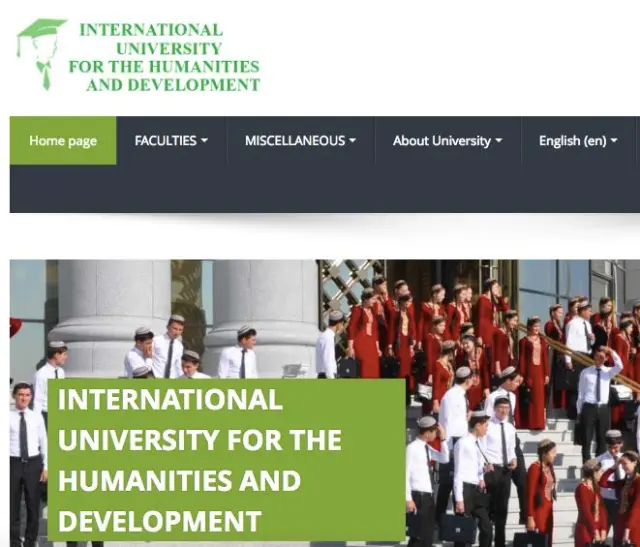
Equipment
As a brand new university, new high technology has been introduced. Each classroom has a digital clock, a white board and a projector. However, white board makers are not included so usually students buy and bring them for their lessons. Some classrooms don’t have wipers or remote controllers for the projectors. The projectors work better with HDMI and malfunctioning happens when using other inputs. Usually, a small number of handouts are printed and shared by several students. This university has intranet, so it is possible for students to download handouts, which teachers upload. However, nobody seems to have used it. All my students didn’t know about it. Therefore, I have been providing literacy media to my students as well as teaching them Japanese language. It is very challenging.
